Ye and Irlmeier co-authors of a "hottest" JTrauma article of 2024
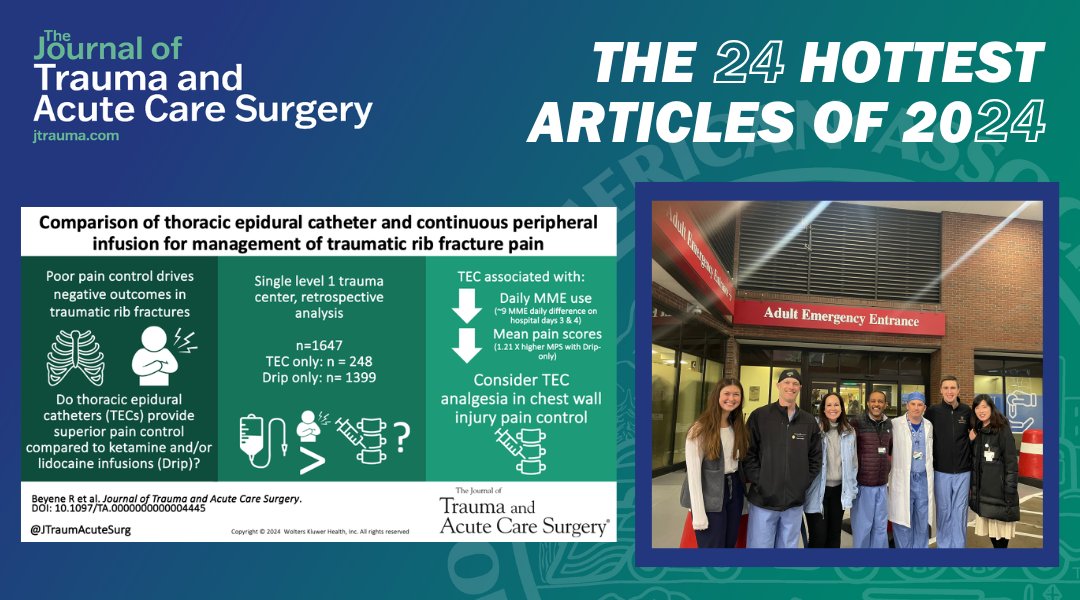
Congratulations to professor <Fei Ye (right) and senior biostatistician Rebecca Irlmeier (MS, 2020) on the naming of a paper they co-authored as one of the 24 Hottest Articles of 2024 by The Journal of Trauma and Acute Care Surgery. "Comparison of thoracic epidural catheter and continuous peripheral infusion for management of traumatic rib fracture pain" was originally published online ahead of print on September 13, 2024 (click title to view).
Jamie Joseph is first author of Child Abuse & Neglect paper
Congratulations to 2024 graduate Jamie Joseph, PhD, on the publication of "Analysis of longitudinal patterns of child maltreatment reports in the United States," which was published online ahead of print on December 24; it is scheduled to appear in the February 2025 issue of Child Abuse & Neglect. Associate professor Rameela Raman is senior and corresponding author of this paper. Co-authors include researchers at Northwestern, University of Kentucky, Vanderbilt's Division of Child and Adolescent Psychiatry, and the Vanderbilt Center for Excellence for Children in State Custody.
Dr. Joseph, Dr. Raman, and their collaborators used National Child Abuse and Neglect Data System (NCANDS) data to quantify geographic variation in child maltreatment rate trajectories, with the larger goal of helping states "identify local risk factors to guide program development and resource allocation." The team found "three groups of states with distinct child maltreatment trajectories, with majority of the states following a stable trajectory over time. There was not a consistent trend in socioeconomic characteristics between the three groups. While the results do not allow us to draw firm conclusions about socioeconomic characteristics associated with maltreatment trajectories, it does provide data-driven evidence for the existing assumption of a national average maltreatment trajectory."
Dr. Joseph is now a biostatistics faculty member at Henry Ford Health. Dr. Raman recently chaired the department's 2024 retreat and served as the American Statistical Association's Middle Tennessee representative to the Council of Chapters the past two years. For more about Dr. Raman's mentoring of Dr. Joseph, see the May 2023 thank-you note from Dr. Joseph published in AmStatNews.

Figure 2 from Joseph et al., "Analysis of longitudinal patterns of child maltreatment reports in the United States." State-level chloropeth map using the three unique trajectories obtained from the latent trajectory model.

Antiviral Use Among Children Hospitalized with Laboratory-Confirmed Influenza Illness: A Prospective, Multicenter Surveillance Study
Co-authors of the Clinical Infectious Diseases paper featured in this article include senior biostatistician Tess Stopczynski and associate professor Andrew Spieker.
Immune-suppressing drug does not improve COVID-19 recovery: study
Associate professor Matt Shotwell is a lead author of this paper. Co-authors include principal biostatistician Josh DeClercq, professor Jonathan Schildcrout, and lead biostatistician Li Wang.
2024 and 2025 Mid-Career Leadership Development Program updates
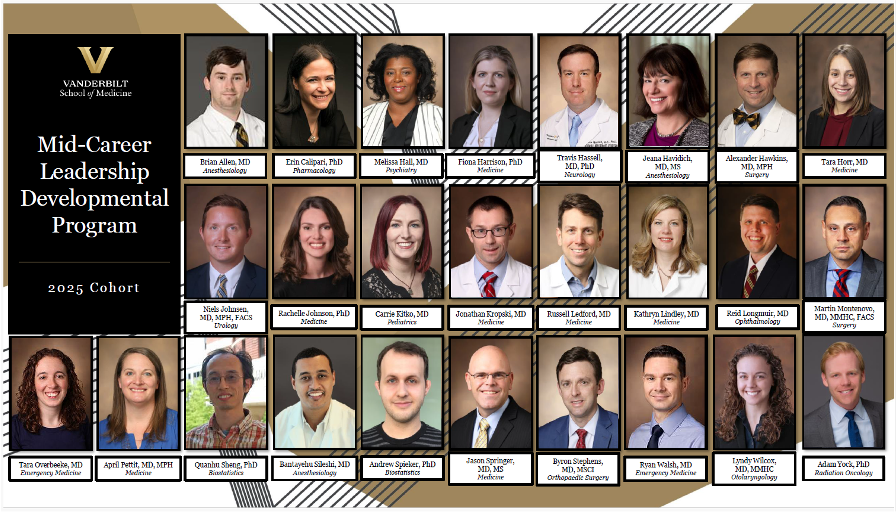
Congratulations to associate professors Quanhu "Tiger" Sheng and Andrew Spieker on being selected for Vanderbilt University School of Medicine's Mid-Career Leadership Development Program (MCLDP). This year-long career development program is designed to cultivate and prepare Vanderbilt faculty for future success as medical center leaders.
As deputy technical director of Vanderbilt Technologies for Advanced Genomics Analysis and Research Design (VANGARD), a role he has filled since 2015, Dr. Sheng provides crucial supervision and training for personnel involved with large-scale initiatives such as the migration of VUMC’s BioVU repository (the world’s largest DNA biobank based at a single academic institution) to the cloud. His responsibilities include helping analytical staff and application developers to best assist users across a wide spectrum (from quantitatively untrained to highly experienced) and anticipate their needs, and representing the chair in multi-institutional working group meetings. He has been indispensable in VANGARD’s construction and maintenance of the genomics data pipeline that has fed into dozens of projects led by Vanderbilt PIs, and his expertise will become even more crucial as VUMC scales up its service to the Alliance for Genomic Discovery.
A well-regarded investigator who has made a name for himself in both statistical methods and collaborative biomedical research, Dr. Spieker is exceptionally passionate about providing top-notch teaching and mentoring. The graduate student body has named him Outstanding Faculty Mentor twice and bestowed on him its Golden Apple Award for Excellence in Teaching in 2021; he was inducted into the Academy for Excellence in Education earlier this year. He has also been vital to the success of Vanderbilt Biostatistics' graduate program as chair of the Comprehensive Exam Committee and member of its Executive Committee, and conducted dozens of evaluations during the past year as co-chair of the Faculty Search Committee and member of the planning and selection team for the Summer Internships for Underrepresented Undergraduates program. In the wider scientific community, he has served on the Regional Advisory Board of ENAR (Eastern North American Region of the International Biometric Society) and as Biometrics Section program chair for the Joint Statistical Meetings (JSM)—the two highest-profile conferences in the biostatistics field. He was also recently elected book review editor of Biometrics, long regarded as one of the most prestigious peer-reviewed journals in the field.
Past MCLDP participants include Fei Ye, Qi Liu, and Ben French. On December 13, the 2024 cohort presented the novel strategic plans they had developed during their year of training to academic medical center stakeholders; these snapshots of 2024 participant Mario Davidson were taken by department chair Yu Shyr.
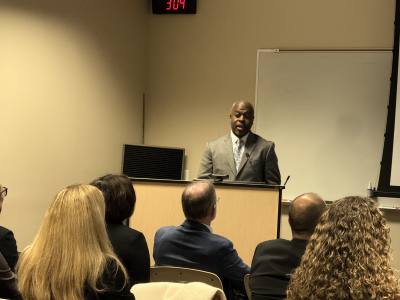
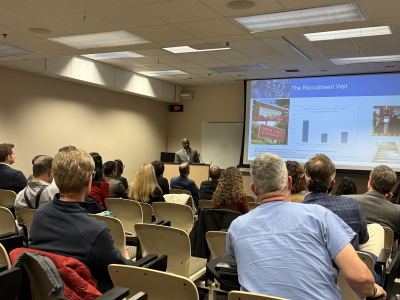
Bryan Helm promoted to principal statistical genetic analyst
We are pleased to announce the promotion of Bryan Helm to principal statistical genetic analyst, effective November 1. Helm earned a BA cum laude in biology at DePauw University, followed by his MS and PhD in ecology and evolutionary biology at the University of Arizona. He was then a postdoc at North Dakota State University (funded by the USDA and NSF) and Indiana University School of Medicine (supported by a T32 fellowship for work in pediatric clinical and developmental pharmacology).
Transitioning into bioinformatics and joining the Department of Biostatistics in 2021, Helm supports research projects with genomic, transcriptomic, and next-generation sequencing analysis, including single-cell and spatial methods. His bibliography includes first-authored papers in Journal of Experimental Biology, Journal of Insect Physiology, Biology Open, and Proceedings of the National Academy of Sciences (PNAS). His recent work includes identifying functionally distinct thymic DC subsets and elucidating requirements for crosstalk with thymocyte subsets that support their homeostasis and activation, with a preprint posted at bioRxiv; members of that team include biostatistics and bioinformatics professor Qi Liu, Vanderbilt University Medical Center colleagues Cody Heiser and Ken Lau, and investigators at the University of Texas at Austin. Outside of work, his activities include serving as an umpire for the West Nashville Sports League.
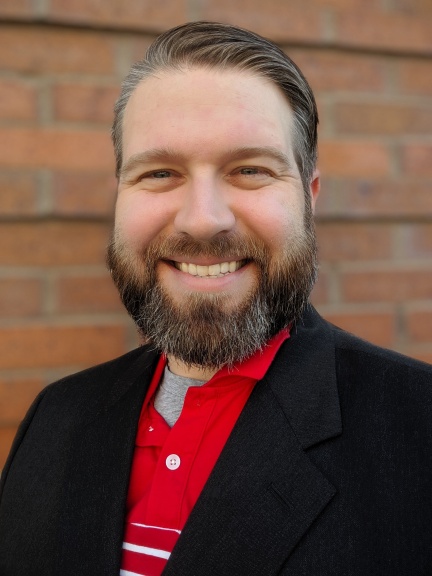
Study identifies that higher West African ancestry may contribute to worse breast cancer outcomes
Co-authors include principal biostatistician Run Fan and professor Fei Ye.
Hui Nian promoted to research assistant professor
We are pleased to announce the promotion of Hui Nian to research assistant professor of biostatistics and orthopaedic surgery, effective December 1. After earning her BS in biology and MS in cell biology from Beijing Normal University, followed by her MS in statistics and PhD in biochemistry at Oregon State University, Dr. Nian joined Vanderbilt University Medical Center in 2010 as a biostatistician. She was appointed to the faculty as Assistant in Biostatistics in 2018, with a secondary appointment in Orthopaedic Surgery added in 2022. Dr. Nian has published more than one hundred peer-reviewed papers, including first-authored articles in the Journal of Applied Statistics ("Performance evaluation of propensity score methods for estimating average treatment effects with multi-level treatments," 2018) and Nicotine & Tobacco Research ("Demographic characteristics, perinatal smoking patterns, and risk for neonatal health complications among pregnant smokers in the United States who begin using electronic cigarettes during pregnancy: A descriptive study using population-based surveillance data," 2024). In demand as a content expert and experienced collaborative statistician among multiple departments at Vanderbilt University Medical Center, Dr. Nian chaired this year's Patrick G. Arbogast Collaborative Publication Award Committee.

Statistical Computing Series: What I look for in a code review
The Statistical Computing Series hosted by Vanderbilt University Medical Center's Department of Biostatistics features presentations on the implementation of statistical models and methods, statistical computation, and graphics. These informal meetings allow experienced statisticians and developers to share their expertise on computing topics with practitioners across Vanderbilt. On Thursday, December 12, 2024, at 2:30 pm Central Time on Teams, principal application developer Cole Beck will present "What I look for in a code review." Here is his description:
Have you ever had your code reviewed, or had to review someone else's? I occasionally have the chance to evaluate someone else's R code - it's always a valuable learning experience for myself and the author. In this talk I'll provide common potential issues I look for in a review, as well as several example solutions.
For access to this webinar, contact series organizer Ryan Moore.
Beck is a 2023 IT Innovation Award winner, and the student body bestowed on him the Golden Apple Award for Excellence in Teaching in 2022. His service to the department also includes contributing to the Vanderbilt Biostatistics Summer Internship for Underrepresented Undergraduate program as a planning and selection committee member and instructor.
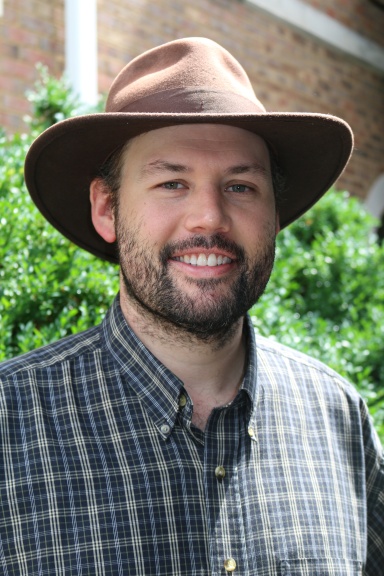
Caroline Birdrow promoted to senior biostatistician
We are pleased to announce the promotion of Caroline Birdrow to senior biostatistician, effective November 1. Originally from New Orleans, Birdrow earned her bachelor's degree in mathematics from Washington and Lee University, with a minor in poverty and human capability studies, and a term abroad in China on management accounting. For her MS in biostatistics from Vanderbilt, she completed her thesis, "Cumulative Probability Models for Semiparametric G-Computation," under the supervision of associate professor Andrew Spieker. At Vanderbilt University Medical Center since 2021, Birdrow has collaborated primarily with Vanderbilt's Critical Illness, Brain Dysfunction, and Survivorship (CIBS) Center; her duties as a biostatistician have included completing data safety monitoring board reports for randomized controlled trials, managing and analyzing observational study data, leading project meetings, and conducting a variety of ancillary analyses in relation to larger projects. She is a 2023 and 2024 winner of travel awards from Women in Statistics and Data Science, a graduate of the ISTAART (International Society to Advance Alzheimers Research and Treatment) Design and Data Analytics PIA (Professional Interest Area) Workshop on applying novel models for longitudinal continuous outcomes (including cognitive function), and a co-author of peer-reviewed papers in JAMA Network Open and Critical Care Medicine. As an ASA (American Statistical Association) GivesBack leader, she has judged the ASA's Fall Data Challenge and Virtual Science Fair, developed community impact projects for JSM 2023 and 2024, and actively contributed to other organizational and peer-review activities. Her service to the Department of Biostatistics includes participating on the hiring and staff onboarding committees, the causal inference working group, and the Ethical Responsibilities group. Outside of biostatistics, Birdrow loves listening to podcasts and music, watching reality TV and documentaries, spending time with her dog, and going for long walks.